News & Media
Charles A. Tindley Accelerated School
November 12, 2009
The Charles A. Tindley Accelerated School in Indianapolis opened its doors in 2004 in what was once a grocery store. Tindley, a charter school for students in grades 6-12, has a remarkable track record for its short history, i.e., notable ISTEP scores and college acceptance letters that line the entrance hall of the school.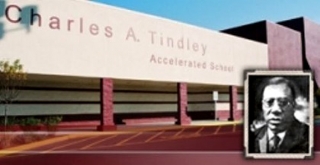
From the start, Tindley has been supported in a variety of ways by DePauw alumni. John T. Neighbours '71, Alan P. Hill '81 and Kenya-Taray Delemore '96 served on the board of directors. Patrick J. Terry '94 was director of operations and four DePauw alumnae have taught at the school: Rosalie Pettigrew '96, Nickola M. Baker '94, Maggie C. Coyne '99, and Courtney Lindsey '05. James K. Baker '53, former chair of DePauw's Board of Trustees, is currently serving on Tindley's board of directors.
Marcus C. Robinson ’94, an English major at DePauw, is Tindley principal and CEO. Robinson worked in college admissions after graduating and realized that he was working with students too late in the game. He has devoted countless hours to his current job and is passionate about his mission as principal. “This has been the most exciting work of my career,” Robinson says.
“We started out as a high school for only students in grades 9-12, but that shifted. We knew that the school needed to be intentionally organic and created to be shifted and moved,” Robinson says. “The vision is the same as when we started - upon graduation, students will be qualified to attend selective colleges and universities.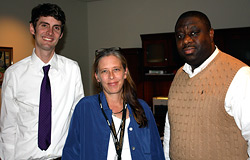 “We decided that we needed to meet kids earlier than ninth grade. This brought up some issues because there were no elementary foundations to support the work for an accelerated charter school,” Robinson says. “We added the middle school grades, and now we can’t blame anyone for what the students come to us not knowing.” (in above photo: Larson, Loescher, and Robinson)
“We decided that we needed to meet kids earlier than ninth grade. This brought up some issues because there were no elementary foundations to support the work for an accelerated charter school,” Robinson says. “We added the middle school grades, and now we can’t blame anyone for what the students come to us not knowing.” (in above photo: Larson, Loescher, and Robinson)
In order for students to be successful in school, Robinson stresses the importance of building relationships with their families. “We work to earn the trust of our families,” he says. “They may say, ‘I may not understand or agree, but I trust.’ Parents will accept reform if the reform is coupled with success.”
Robinson is available 24/7 to talk with parents. “Each parent has my business card with my home and cell phone numbers. I tell them to call me,” Robinson says. “Wouldn’t you call your doctor over the weekend if your child became sick? Then why wouldn’t you call me if your child got a failing grade on an exam?”
“We need audacious teachers and effective instruction and curriculum design,” Robinson says. That’s why every Friday afternoon the students go home at noon so teachers and administrators can have time for professional development. “Teachers need time to continually refocus and improve practices.”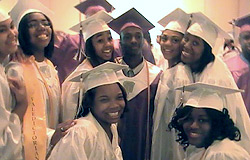 Progress reports are sent home every Friday. “Positive peer pressure works. For students who have grown comfortable with bad grades, we push them not to be comfortable,” Robinson says. “We reinforce our expectations and then celebrate and applaud the students’ achievements.”
Progress reports are sent home every Friday. “Positive peer pressure works. For students who have grown comfortable with bad grades, we push them not to be comfortable,” Robinson says. “We reinforce our expectations and then celebrate and applaud the students’ achievements.”
Siri A. Loescher ’84 is one of the school’s founders and academic dean. “At DePauw, I considered dropping a history class taught by Professor Emeritus of History Roderick A. Clifford. He convinced me to stick with it. He said, ‘I’ll teach, you think,’”Loescher says. That bit of advice stayed with Loescher and, over the years, has influenced her to expect the same of Tindley students. “We compel them and guide them. They can’t give you what they’ve never experienced.”
“We’re a building full of believers. Tindley is a school of choice,” Loescher says. “Nothing gives credibility like believers,” Robinson adds.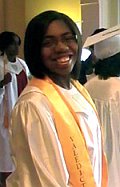
ShaDe’ Nicole-Kirby Watson ’13 (at right) was class valedictorian at Tindley last spring and came to DePauw already having experienced college-credit courses. At Tindley, juniors and seniors take college-credit courses from Anderson University adjunct professors and graduate from Tindley with two transcripts. Not all colleges and universities accept the university credits. It depends on the school, and students know this when applying to colleges.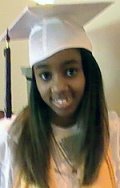 “At Tindley, the teachers stay with you until you get it right,” Watson says. “If all teachers stayed until students got it right, then they’d all do well.”
“At Tindley, the teachers stay with you until you get it right,” Watson says. “If all teachers stayed until students got it right, then they’d all do well.”
Amber E. Wright ’13 (at left) graduated from Tindley last spring as salutatorian. “I now know why Tindley is considered a prep school,” Wright says. “At Tindley we worked a grade ahead. I feel very prepared academically to be at DePauw.”
James D. Larson ’05, history major and secondary education minor at DePauw, teaches social studies at Tindley. “Tindley is the only school in Indianapolis, and one of a few schools in the Midwest, that implement and search for innovative ideas for education reform, especially for urban education,” Larson says. “Tindley defies all conventional notions of schooling and instead values what works for the students we serve.”
Larson credits DePauw with preparing him to teach at Tindley. “Einstein described a liberal arts education as knowledge acquired beyond textbooks,” Larson says. “I think DePauw prepares students to work at places such as Tindley by exposing them to the broader socio-political issues facing our nation and world and by asking students the question, what are you going to do about these problems?
“More concretely, the curriculum at DePauw, like other liberal arts schools, is not about inculcating you with a toolbox of skills that will help you be successful in a certain career. Instead, it introduces you to a host of burning questions that our world is in desperate need of solutions for,” Larson says.
Contact Us
Communications & Marketing

Bob Weaver
Senior Director of Communications
- bobweaver@depauw.edu
- (765) 658-4286
-
201 E. Seminary St.
Greencastle, IN 46135